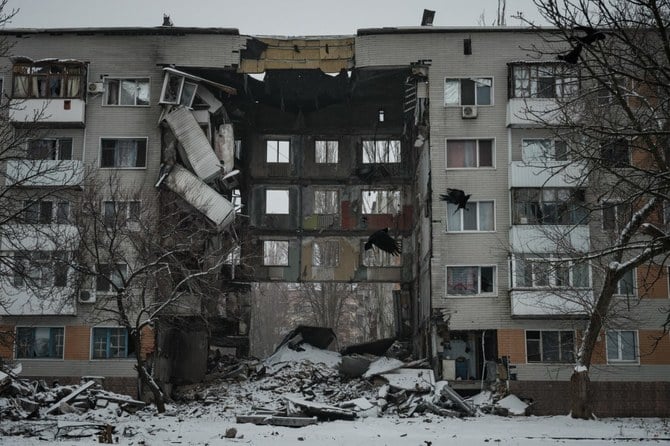
- ARAB NEWS
- 18 Jul 2025

The Ukraine war is approaching its anniversary and the situation complicates daily. Kyiv has accused Russia of bombarding power facilities across Ukraine, while on Monday Ukraine’s energy minister insisted that the country’s power system was meeting people’s “electricity needs.” Chechnya’s leader Ramzan Kadyrov argued in an interview with the Rossiya-1 channel that Russia could take Kyiv, Kharkiv and Odesa, while Yevgeny Prigozhin, the leader of the Wagner Group, stated that Russian forces are facing resistance as they attempt to capture the Ukrainian city of Bakhmut.
While the rhetoric and actions on the ground (including new waves of missile attacks) have not changed their character, there have been some challenging escalations in the last week, including the possibility of bringing a potential NATO member into the conflict.
Last Friday, Moldova’s Ministry of Foreign Affairs and European Integration summoned the Russian ambassador to protest that a missile crossed the country’s airspace, over the village of Mocra in the Transnistria region. The missile was followed as it made its way over Cosauti in the Soroca District, heading toward Ukraine. This technically only relates to bilateral relations, since Moldova has traditionally taken a neutral stance on NATO membership, but since the start of the Ukraine war its position has shifted, with President Maia Sandu stating in January that there was “serious discussion” about joining “a larger alliance.”
Moldova has already been indirectly impacted by the war, as it has faced severe economic shocks due to its disrupted transport corridors. This is mainly because Moldova is fully dependent on Russian gas. The country is suffering an energy crisis and household energy tariffs are soaring. Exports to Russia of medicines and apples have been disrupted and there has been a drop in remittances due to EU sanctions. The country is also affected by electricity blackouts caused by Russian missile strikes on neighboring Ukraine. At the beginning of the crisis, there were concerns that Moldova would be drawn directly into the conflict; though this remains unlikely, last week’s incident has certainly complicated its position.
The overall picture is that Ukraine has support, but material aid will not appear as quickly as it would like
Dr. Diana Galeeva
Surely significantly, the day after the missile incident, the pro-Western government of Moldova resigned after 18 months in power, citing political and economic crises due to the Ukraine war. Nonetheless, the prime minister-designate who has stepped into the breach, Dorin Recean, supports strong relations with the West, meaning the course of the country will likely not be changed in terms of its foreign policies. Instead, there are suggestions that further steps may be taken to join NATO or, as a minimum, strengthen military collaborations.
There is, however, one matter preventing its membership of NATO, which is that the eastern Moldovan region of Transnistria has a large Russian military presence, in addition to a minority Russian population. Any overt approaches to the Western alliance would carry significant risk. Therefore, limited collaborations will most likely be pursued, at least in the immediate term. This is one of several factors in the possible de-escalation of the conflict.
While Moldova’s position is not generally considered critical in the context of the Ukraine war — with it not formally being a NATO member — Romania’s is vital. This NATO member state has denied that Russian missiles flew over its territory last week. The official statement given by Bucharest was that it detected an “aerial target launched from the Black Sea from a ship of the Russian Federation,” but “at no point did it intersect with Romania’s airspace.” This was a denial of Kyiv’s claim that two Russian rockets crossed Moldovan and Romanian airspace.
Romania has also been hit by humanitarian, economic and political fallouts from the war and it has supported its northern neighbor in various ways. However, its position is both complex and critically important — it is a NATO ally but is juggling several possible outcomes from the progress of the war. Different possible scenarios can impact hugely on the state’s future.
The second dimension that mitigates against de-escalation is Volodymyr Zelensky’s first visits to Britain and France since the outbreak of war, pressing the Western alliance to offer more weaponry and fighter jets. In France, Emmanuel Macron vowed that Paris would assist in Ukraine’s fight, stating that the country is “determined to help Ukraine to victory and the reestablishment of its legitimate rights.” Similarly, German Chancellor Olaf Scholz showed strong support by stating he would back Ukraine “financially, with humanitarian aid and with weapons.”
In the UK, Prime Minister Rishi Sunak promised that “nothing is off the table” with regards to sending military support to Ukraine. He also stated that, as part of the talks with Zelensky, he was looking at the “supply chain” involved in deploying British fighter jets, suggesting that other states might have to sign off a UK decision to supply them to Kyiv. The overall picture is that Ukraine has support, but material aid will not appear as quickly as it would like — this most likely indicates a prolongation of the conflict.
In December, the Kremlin warned of a “long” war after US President Joe Biden offered support to Zelensky during his visit to Washington. The developments of the last week, involving both the dilemmas facing Ukraine’s near neighbors and Western powers’ conditional support, suggest it will be some time before a clearer picture — let alone an end to the hostilities — emerges.